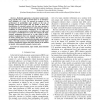2113 search results - page 362 / 423 » Learning Multi-modal Similarity |
DEXAW
2010
IEEE
14 years 11 months ago
2010
IEEE
Abstract--Statistical approaches to document content modeling typically focus either on broad topics or on discourselevel subtopics of a text. We present an analysis of the perform...
GECCO
2008
Springer
14 years 11 months ago
2008
Springer
We propose a method of knowledge reuse between evolutionary processes that solve different optimization tasks. We define the method in the framework of tree-based genetic progra...
AAMAS
2008
Springer
14 years 10 months ago
2008
Springer
Abstract Multi-agent simulation is applied to explore how different types of task variety cause workgroups to change their task allocation accordingly. We studied two groups, gener...
109
click to vote
AR
2007
14 years 10 months ago
2007
—Researchers in robotics and artificial intelligence have often looked at biology as a source of inspiration for solving their problems. From the opposite perspective, neuroscie...
CN
2010
14 years 10 months ago
2010
The natural world is enormous, dynamic, incredibly diverse, and highly complex. Despite the inherent challenges of surviving in such a world, biological organisms evolve, self-org...

